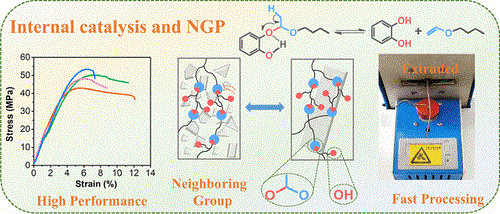90. (Macromolecules) Fast Reprocessing of Acetal Covalent Adaptable Networks with High Performance Enabled by Neighbouring Group Participation
writer:Qiong Li1, 2, Songqi Ma1*, Pengyun Li1, 2, Binbo Wang1, Zhen Yu1, Hongzhi Feng1, Yanlin Liu1, Jin Zh
keywords:热固性树脂,
source:期刊
specific source:Macromolecules
Issue time:2021年
Covalent adaptable networks (CANs) represent a transition material combining favorable features of thermosets and thermoplastics. However, it is still a huge challenge to simultaneously achieve fast reprocessability and high performance for CANs. Here, we designed catechol-based acetal CANs to achieve continuous reprocessing without sacrificing thermal and mechanical properties. A small-molecule model study demonstrated the significantly accelerated acetal exchange by neighboring group participation (NGP) of phenolic hydroxyl. Using this internally catalyzed acetal chemistry, a series of CANs with a broad range of properties were simply prepared from bio-based epigallocatechin gallate (EGCG) and tri(ethylene glycol) divinyl ether (TEGVE) via one-step “click” cross-linking without using catalysts or releasing small-molecule byproducts. The dynamic nature of the CANs was confirmed via stress relaxation and multiple recycling methods including extrusion. While the dense cross-link density and high rigidity of the network provided high solvent resistance and mechanical properties. This work provides a promising and practical method to produce fast-reprocessing dynamic covalent polymer networks with dense cross-link density and superior performance.

全文链接:Fast Reprocessing of Acetal Covalent Adaptable Networks with High Performance Enabled by Neighboring Group Participation | Macromolecules (acs.org)